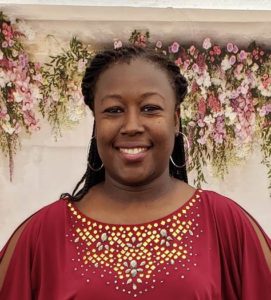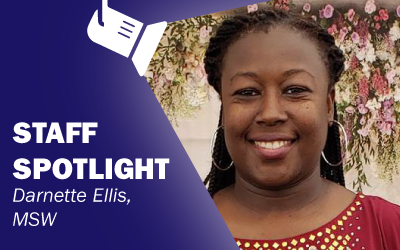
Social Work Coordinator
Foster Home Services
In honor of National Social Work Month, JCCA sat down with Darnette Ellis, one of the Social Work Coordinators for Foster Home Services specialized programs. Darnette is also a former social work fellow at JCCA and with UJA, who completed her MSW while working at JCCA. We discussed her fellowship and how she would define social work. Our conversation has been edited for clarity and length.
JCCA: What first brought you to JCCA and why did you apply to become a fellow?
I migrated here from Jamaica, and I was trying to find a job. I had a friend working at JCCA and she submitted my application. I started in 2013 as a sociotherapist. The job reminded me of my job back home—because I was a teacher for thirteen years. There was the same camaraderie, I had really great foster parents and sweet kids, and I had supervisors who would walk me through the things I had not experienced before. It was a learning curve for me, a culture shock; I was always learning something new. I enjoyed the job I was doing, and I felt this was something I wanted to continue to do.
JCCA: Tell me about your initial work at JCCA and what the process was when you were a fellow.
I started working with JCCA in 2013 as a sociotherapist in the medically fragile department. I applied for school and started in 2016 as a fellow, and completed my Social Work degree in 2018. I did my internship in the adoption department, while doing therapy with kids. As a UJA Fellow, I also attended seminars to fullfill my requirements.
JCCA: Was it challenging to balance work and school?
It was very hard to balance, because you are really doing three tasks: going to school, doing your internship, doing your work. But the help comes from your colleagues and your supervisors. Taking time for self-care was really emphasized, and that helped too. It’s hard, but you get so much guidance. I had a lot of support at JCCA and UJA. I will say this though —social work school teaches you a lot, but the actual work teaches you way more.
JCCA: What makes you passionate about your work?
Permanency. Achieving permanency is so important. Kids are not placed in the system to be held in the system. Also, working with kids! I’ve worked with kids my whole life. It’s something I guess I am meant to do.
JCCA: How would you define social work? Has your understanding of social work changed over the years?
A social worker is everybody’s person. We are counselors, teachers, mentors, sometimes mothers or fathers. We are everything to our cases. I think I always had an idea of what social workers did, but just didn’t know everything happening behind the scenes.
JCCA: What is a moment that had brought you joy or inspired you lately?
I don’t remember the exact number, but since becoming supervisor we were able to finally discharge many kids out of care, especially in the last year. Once you see that it has worked— the parent has completed their services, they are engaged, they are planning for their kids — I am excited to let them go live their happy lives. I tell them ‘I don’t want to see you again!’ When permanency occurs that is my day.
JCCA: Anything you would like to add?
Social work is hard work, but you never do it alone.
